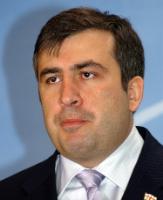On the basis of preliminary returns and exit polls, President Mikheil Saakashvili declared an overwhelming victory for his party in yesterday's legislative elections in the former Soviet republic of Georgia. Many observers had hoped that the vote would end the protracted and vicious political infighting that has characterized Georgian politics in recent years, but Saakashvili's opponents immediately contested his claim. A prominent opposition leader, David Gamkrelidze, accused the government of the incumbent president of falsifying the results and called for new legislative elections. Nine political parties and three blocs competed for representation in the 150-member parliament. Half of the seats were chosen by party lists; the other half through direct elections. According to the latest returns, Saakashvili's United National Movement won 62 percent of the votes cast by party list. The next highest total went to the United Opposition bloc, which lagged far behind at 14 percent. Approximately 3.5 million Georgians were eligible to cast ballots at 3,500 polling stations. The immediate issue is whether Saakashvili's United National Movement party will obtain a constitutional majority, which requires winning two-thirds of the 150 seats. Such a margin would allow the president to continue to ignore his political opponents, who remain marginalized and alienated.
Parliamentary Elections Fail to End Georgia’s Political Crisis

